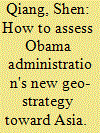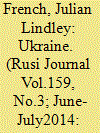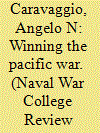| Srl | Item |
| 1 |
ID:
104016


|
|
|
|
|
| Publication |
2010.
|
| Summary/Abstract |
In response to the complex and profound changes in the world geo-political landscape following the disintegration of the bi-polar world structure, the Obama Administration, since day one, has put more emphasis on Asia and adopted a new geo-strategy toward this part of the world. Its main strategic intention is to tilt the geo-strategic focus from the Middle-east and Central Asia to East Asia. The US has increased engagement with and input to Northeast Asia, Southeast Asia and South Asia, the strategic intention of which is to turn these three parts into tightly-connected key links in its new Asia geo-strategy so as to extend the "three-island chain" it developed in Northeast and Southeast Asia in the Cold War period to South Asia. By so doing, the US seeks to reinforce and expand its presence in Asia in regional geo-political landscape, occupy the dominant position, prevent and contain any challenge to its advantageous position.
|
|
|
|
|
|
|
|
|
|
|
|
|
|
|
|
| 2 |
ID:
185347


|
|
|
|
|
| Summary/Abstract |
Many conceptualizations of homeland security posit a rigid division between national security, which focuses on global threats and challenges at the systemic level, and homeland or domestic security, which focuses on internal threats and challenges inside a state. Thus, in the United States, Iran is a national security threat, while human trafficking or natural disasters are homeland security threats and challenges. The American conceptualization has come to dominate much of the academic literature and curriculum on homeland security. Analysis of courses in domestic and homeland security in the Middle East shows that an American model of homeland security is a frequent export of American-style education. However, this artificial division is not relevant for small states, even aspiring regional powers, because their security priorities overlap the domestic and international. A case study of the United Arab Emirates demonstrates that its key security priorities are shaped by both domestic and global inputs, and require solutions at both levels. However, many courses on domestic and homeland security in the Emirates do not reflect this reality. In studying and teaching security in non-superpowers, the homeland security concept should be updated to properly fit the strategic context of a small state in theory and practice.
|
|
|
|
|
|
|
|
|
|
|
|
|
|
|
|
| 3 |
ID:
132088


|
|
|
|
|
| Publication |
2014.
|
| Summary/Abstract |
As NATO prepares for the Wales Summit in September, the crisis in Ukraine and the resultant tensions with Russia have changed the geostrategic context in which the Alliance operates. Julian Lindley-French steps into the Russian mindset to analyse the motivations behind the country's assertive behaviour, and argues that it is vital that the West does the same.
|
|
|
|
|
|
|
|
|
|
|
|
|
|
|
|
| 4 |
ID:
133081


|
|
|
|
|
| Publication |
2014.
|
| Summary/Abstract |
Criticisms leveled at the Japanese for their "ill conceived" or "poorly planned" attack at Pearl Harbor on 7 December 1941 have failed to consider the true depth of vision and professional intellect of its principal architect, Commander Minoru Genda.1 Charges of failure to execute follow-on attacks against the harbor facilities, if any such attacks were planned at all, or to exploit the immediate advantages created in the Central Pacific after the attack are commonly made by both academic and professional military scholars. Genda has suffered the brunt of this criticism. But in fact Genda's plans were neither ill conceived nor poorly assembled-they were just not executed as originally envisioned.
|
|
|
|
|
|
|
|
|
|
|
|
|
|
|
|